More on News
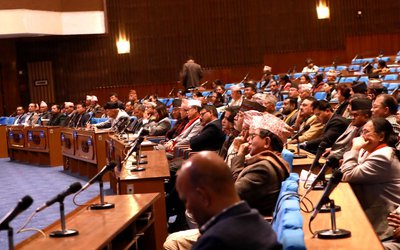
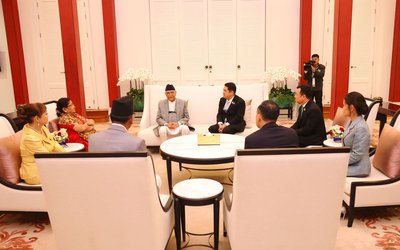
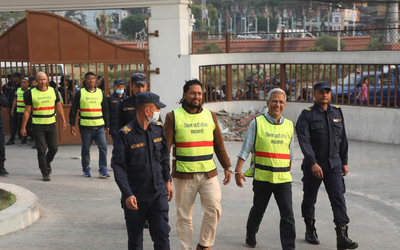
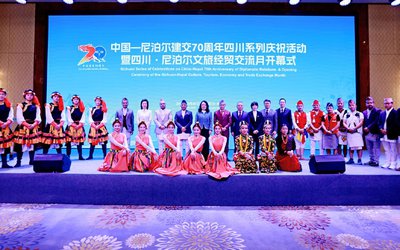
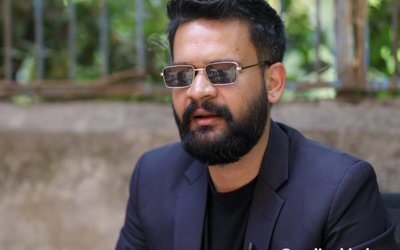
Every Nepali citizen has been cherishing the dreams of a peaceful, progressive and prosperous new Nepal ever since the success of Jana Andolan II in 2006. Everybody believed in Nepal’s leaders who left nothing for imagination when it came to making promises and thus placed unconditional trust on them by taking part in the constituent assembly elections amidst confusion and uncertainty. In return what the Nepali leaders seem to have delivered is the most unimaginable action in any nation’s history—mismanaging the country so badly that it has given rise to a real danger to Nepal’s independence and sovereignty, safeguarded and nourished by the ancestors ever since its existence. To think that the time that elapsed is less than three years in which the present Nepali leaders could spring such act plunging a peaceful and developing nation into the margins of terror, though unbelievable, appears to be unfortunately true.
Though yet to be firmly confirmed, the revelation of security threat and terrorist movement in Nepalese soil raised by the media during an Indian diplomat Mr. Shyam Sharan’s recent visit to Nepal and the concern expressed by the United States of America following his visit is truly frightening. No patriotic Nepali national can keep a blind eye to this alarming development as there is bound to be a natural reaction from China to this revelation that would be of equal concern to it. Nepal has been remaining apprehensive and alert throughout its history about the danger of intrusion of various forms from the south and now suddenly the course seems to have changed in reverse.
For the sake of Nepal and its closest neighbors the only option left under the present circumstances is to strictly regulate the open border between India and Nepal. Why not go for a few manageable entry points between the two countries thus closing the open border for all times to come to prevent undesirable activities from either side. At this juncture nothing can be more important or desirable than to find an appropriate means which would not only provide adequate safety measures to the security of both nations but also check the ever increasing suspicion on each other’s conduct that is eroding the harmonious relations existing between them.
The endless political game of hide and seek so cleverly played by champions of a new change and all inclusive democratic society, though entertaining to those interested and waiting to take advantage of Nepal’s growing insecurity and instability is however extremely painful to Nepalese people. In this context the sudden visit of a controversial
Indian diplomat who is now an advisor to the Indian Prime Minister cannot be taken as a mere coincidence or a part of preplanned visit.
Although the kind of great concern that the Indian diplomat expressed about Nepal not being able to provide constitution and advance peace process is noteworthy in so far as it is made in good faith and intention but would a mere public expression be convincing enough to satisfy the aggrieved country and its people who know the Indian government’s hand and interest behind every important development mostly, if not totally, that has taken place here in Nepal. What transpired between him and political leaders including the Prime Minister is yet to become clear. But the views expressed by different personalities after meeting him are not encouraging and thus his mission seems to have failed politically.
Today Nepal is at the threshold of political stability versus disaster, independence versus subservience, national sovereignty versus foreign dictate. It would not be enough to simply fret over lost control of a nation’s dignity and honor, primarily owing to lack of vision and insensitivity to issues of national interest including national unity. Faced with a dangerous situation threatening Nepal’s independence and sovereignty Nepalese leaders must first put their house in order and hand over the leadership of the country to the younger generation to confront existential as well as developmental challenges.
Following the agreement reached at the dead of the night and the resignation of Madhav Kumar Nepal as Prime Minister of Nepal, though belated, had at least provided another opportunity to parties for formation of national consensus unity government by breaking the deadlock created over time as a result of their misunderstanding, mistrust and misdeed to lift the country from the morass of corruption, crime and impunity. And now this opportunity also is going to be missed as the race is already on for formation of a majority government and that even if accomplished is not going to deliver the nation what it has been asking for. How long a country already wounded and humiliated severely by leaders because of their incompetence, irresponsibility and myopic vision could afford to accept the present leaders is a burning topic of the day?
After having failed to elect a new Prime Minister for the fourth time even by majority system and yet insisting on to try again for the fifth time Nepalese leaders are fast losing their ground as a result of their shortsightedness, narrow mindedness, illogical and different stand and behavior. They look like a pendulum of the clock swinging in opposite direction regularly causing irreparable damage to Nepal’s credibility in the eyes of the international community. Would they ever stop looking at each other as enemies is a million dollar question? After all the people can not afford to let the party leaders continue to play with their fate as they like and choose. What is today’s necessity must be considered seriously and pursued accordingly.
The alternative to national consensus unity government at this time could be the end of existing little remnants of democratic system at least for a few years more if not for ever. Therefore in order to avoid the country from going into wilderness the sovereign people should come forward once again, put adequate pressure on the leaders not to deviate from the right path and finish the job with national reconciliation always in mind.
The more the common people suffer the more their disenchantment and frustration with them. And right now there is a very little chance for the young leadership to emerge suddenly and take over the reins of the government and steer the country out of this long crisis never seen in Nepalese history. So it is up to the senior leaders to realize the danger of continuing their date expired leadership and stick to power irrespective of growing disaffection and distrust of the people towards them. Under the circumstances what is needed is to encourage and involve the young generation leaders to share power effectively with some of the less controversial and sincere senior leaders. A peaceful and orderly transfer of leadership to younger generation can be made smoothly at an appropriate time later as is already shown and proved so effective and successful in Nepal’s neighboring countries including China. And this is the kind of thinking that is surfacing frequently not only from the rank and file of each party but also from the people in general.
How many crossroads Nepal will have to pass through to reach its destination can not be said today as it has already been proved that every time a new opportunity came to it to take the right decision it always went for the wrong one. The result is obvious. The country is now on the verge of collapse from political, economic and social point of view. To linger on and stick to wrong decisions taken earlier by political leaders from time to time in haste and whims without any consideration to supreme national interests simply for their vanity, power hunger and self assumed supremacy or superiority could be extremely disastrous and suicidal. Those entrusted with the gigantic task of building a new Nepal by the people from constitution writing and taking the peace process to its logical end through the election of constituent assembly should not hesitate to review and revise their thinking and position before it is too late. The constituent assembly members must come forward and make amends to the new concept projected so far which would surely push the country into ethnic conflict, civil unrest and its disintegration as its main ingredients yet to be enshrined in the new constitution seem to be seriously defective, faulty, impractical and infeasible.







